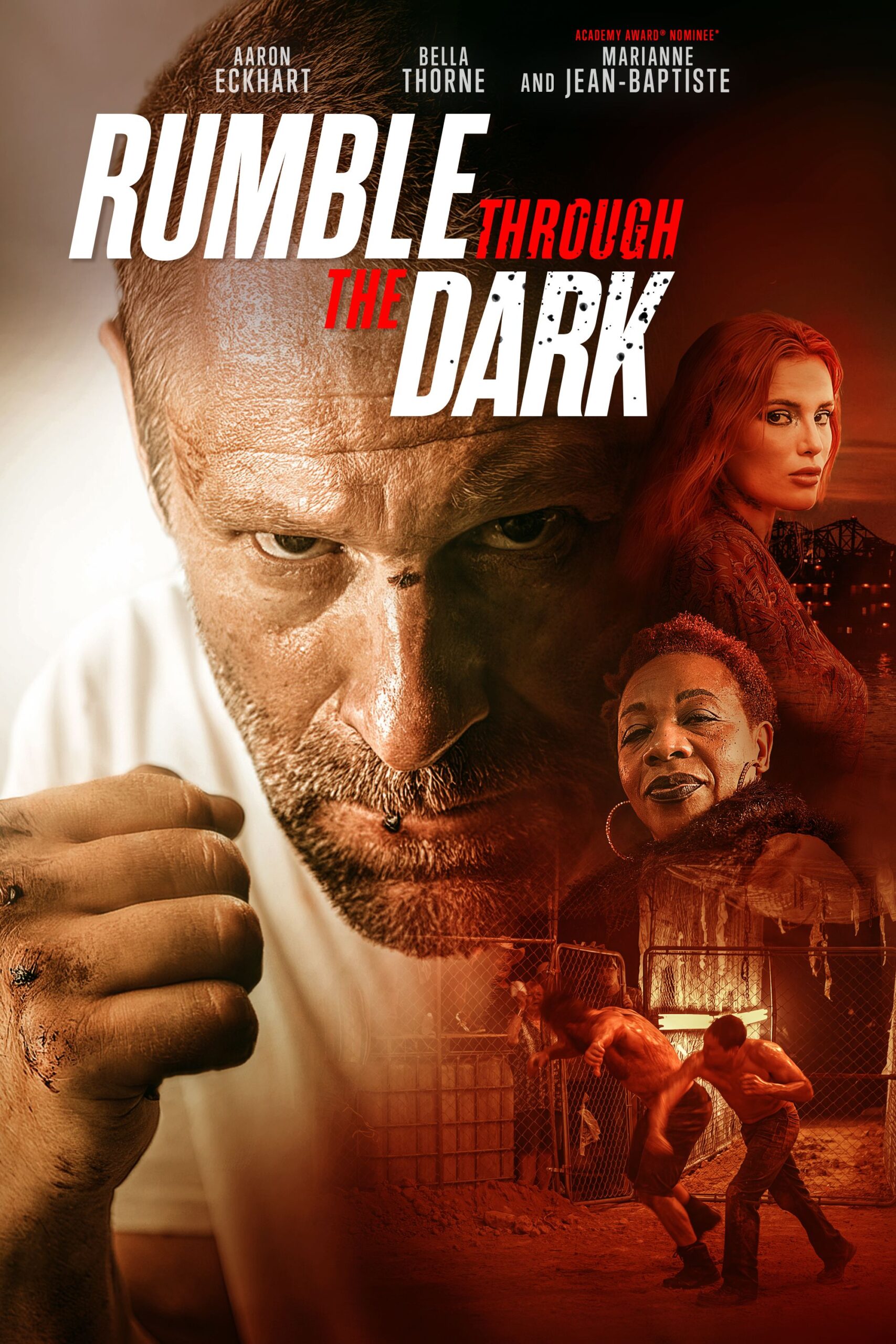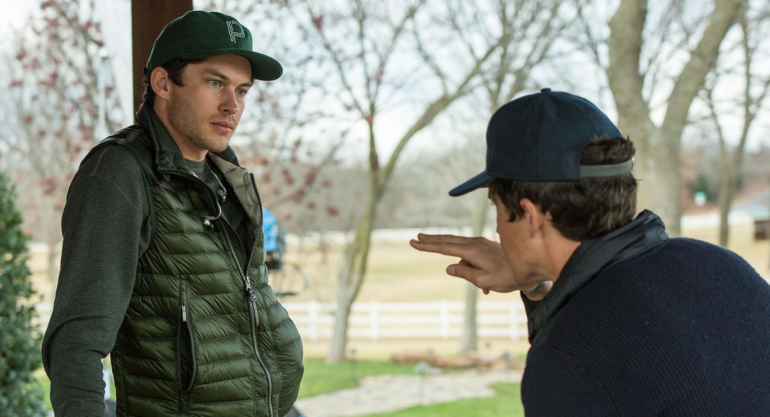In Rumble Through the Dark Golden Globe® nominee Aaron Eckhart (The Dark Knight) stars as a desperate, bare-knuckle cage fighter battling for the only thing he has left in Rumble Through the Dark, a riveting action-thriller based on Michael Farris Smith’s celebrated novel The Fighter. Bella Thorne (The DUFF) shines alongside Eckhart in this gripping film about one man’s last-ditch effort to save his family home against the strongest of foes and the longest of odds.
I recently got to chat with directors Graham Phillips and Parker Phillips about the movie.
Hi guys, thanks for taking the time to chat today.
We’re excited to be here. Thank you,
I really enjoyed your latest movie Rumble Through the Dark and Aaron Eckhart gave one his best performances. What was it that appealed about the script that made you want to direct it?
Well, a couple of things. One, we really wanted to explore that Southern Gothic noir genre just because the environment plays such an interesting psychological role. It almost becomes a character in and of itself, between the heat and the history of that part of the country. It’s kind of like the Ireland of the States, as far as all this art from the Blues, and the literature that comes out of that spot. But we also were just drawn by how cinematic the imagery was in the novel where it just felt like the words flew off the page. We were really interested in doing a film about a lone wolf, someone with a really singular through line with a very clear objective. That sort of path of isolation, which was inspired by movies like Taxi Driver, and more recently, Joker, and we wanted to do that in a different sort of environment that was less urban. When we read this book, we’re like, This is it.
Also, I think the story of The Fighter seemed like something that hadn’t been done yet, to really see that underground bare knuckle fighting world, which really does exist, but at the end of the day really becomes at the end of our film, almost like a modern-day gladiator fight. For us to have one foot in realism and one foot more of this heightened world. That was really exciting for us as filmmakers.
Like I said, Aaron Eckhart is fantastic but he really goes through Hell both emotionally and physically for this movie. How did he prepare for the role? And how did you help him to prepare for it?
Yeah, from our very first call with him, he really set the bar very high for his performance; he realized that this is something he hadn’t done before. Then physically, emotionally, mentally, he really had to go to a place that he hadn’t gone before, as an artist, and Graham and I had a huge amount of respect for the performances in his past and some of the choices he’s made as an actor. But also, we were excited about seeing him do something you hadn’t seen before. Aaron got out there himself months early and began training in Mississippi. He had to lose a lot of weight for the role to get in the correct physical shape. He was there working on his accent. Our stunt coordinator got there early, and he was there in the gym, working out with those guys learning the moves; there are multiple fights in the movie and he really just threw himself into the role. He, himself has a background in jujitsu so, he was bringing a lot of himself to it as well as far as his own techniques. I think it’s important in a film that deals with action to not only tell character throughout the scenes where people are talking together, but also to tell character throughout the action and how a person attacks and how a person defends himself. We really wanted to make Jack the bare-knuckle fighter; he’s very homegrown. He’s taught everything himself. Aaron really kind of helped us discover who Jack was and who he would be for the screen.
Anytime I speak to stunt coordinators they say a fight scene should tell a story in itself; we should have a beginning, a middle and an end. It should only happen to push the story and characters forward and never just be action for the sake of action. Would you say that’s true?
Yeah, absolutely. I mean, that’s what’s so great about working with stunt coordinators that we were able to work with – Boyd Bateman, and David Conch; they’re artists in their own right. It’s ridiculous that there’s not a category at the Academy Awards for them because it’s a form of storytelling. Just like you said, it can shed light on the psychology of a character or drive that story forward. It’s so important, especially for a film like this, where it’s the microcosm, it’s the metaphor of his whole life’s journey carried in these fights. It can’t just be for the excitement of the fight. It has to speak to something deeper emotionally.

When you’re dealing with an adaptation, do you tend to stick to the script more stringently, or do you still allow improvising?
That’s a good question. I felt like we definitely felt licensed to have the proposition if we needed it. But to be honest, we really stayed close dialogue-wise to the script. There’s a scene about a little more than halfway through the film, which in screenplay terms would be called the all is lost moment for the protagonist where Aaron goes into this motel room he’s living in, and he basically confronts himself in the mirror, and that scene was written with no dialogue, whatsoever. During this scene, there are flashbacks for when his character was bullied as a child. The first time his character fights was on the playground. That’s where he learned to fight. So, there’s flashbacks to when as a boy, he first had to learn to fight and there was no dialogue written. When Aaron came into that scene, he filled the space with these lines that were completely improvised, and most of them made their way into the film. We completely encourage that. I think for me, that’s probably my favorite moment in the film. That’s the most personal. But yeah, a lot of that was improvised.
Generally, what do you look for in a script for you to be interested in the project?
Well, it’s funny, because we wrote the first one and the second, we fell in love with the novel. We have a very specific relationship with that. I think that Parker and I are drawn to the epic; our favorite movies growing up were Gladiator, Braveheart and The Last Samurai. Even though just by necessity, (and I think that this was a good thing,) we’ve had to make films at a certain budget level with a certain amount of days, without too many extras and whatnot. There’s a certain quality to the films that we’ve made, that has this sort of epicness, even if it is a very personal journey, like with Jack, in some ways, we see the final fight as our version of Gladiator; it’s got this sort of Colosseum gladiatorial back to it. We’re always looking for that. I think that homecoming and sort of coming back to yourself and self remembering and coming back to the family is a really important theme for us. A really basic level to just making sure that your protagonist is in a different place than where he started out. We want to tell a journey as directors, and I think that’s really important that the film takes you someplace and hopefully against all odds it surprises you.
I loved the music to this film. How did you work with composer Brad Smith in creating the sound for the movie?
Yeah, Brad Smith, we’ve worked with him since our first short film. He was one of the founding members of Blind Melon; he was their bassist. He’s from Mississippi and he had written the title track, which he called Brass Knuckles. Maybe a year and a half before we started filming. He was so inspired to work on this; normally you lock the picture, and then you give it to a composer and they do their thing. But we were actually cutting the film with a lot of what he had already given us. I mean, he probably wrote 60 tracks of which there are maybe 30 in the film. He created instruments specifically for this story; he created this thing which is basically a giant oil drum with hide wrapped over it and two strings, tuned to a fifth part on a double bass. I mean, it’s a total Frankenstein instrument; a double bass neck, and he would play it using a slide and slapping it with like an antler, or sometimes play it with a bow. It just had this deep very emotional, almost like a moan of anguish. There’s so much pain that Jack Boucher goes through and it sort of reminded us of that iconic soundtrack that Joker had with this deep emotional sound with all sorts of rumblings if you will, coming from the primordial underbelly of who Jack is; that awakening, and yeah, he’s just the coolest guy. I mean, we’re gonna work with him on probably every film we ever do. He’s such a great collaborator, and just such a cool dude.
What would you like audiences to take away from the film?
One very basic thing, which is pretty central to the film is don’t take the people in your life that you are going to miss for granted. That’s very central to what this film is and what’s turbocharging our hero’s journey is that he feels like it’s too late. He has regrets over how much time he’s spent with the person who loved him most.
And hopefully that the fights are badass (laughs). We put a lot into them.
They were they were awesome. Thank you, guys for taking the time to chat and all the best with the film.
Thank you so much.
RUMBLE THROUGH THE DARK will be available in select theaters November 3 and On Demand and Digital November 10 from Lionsgate.






